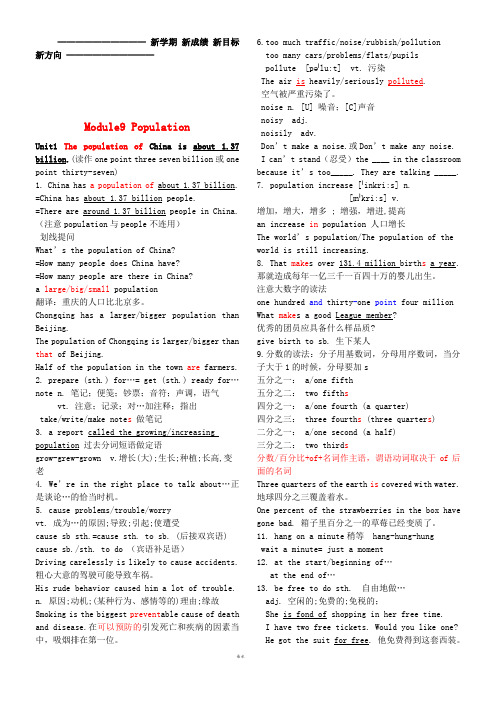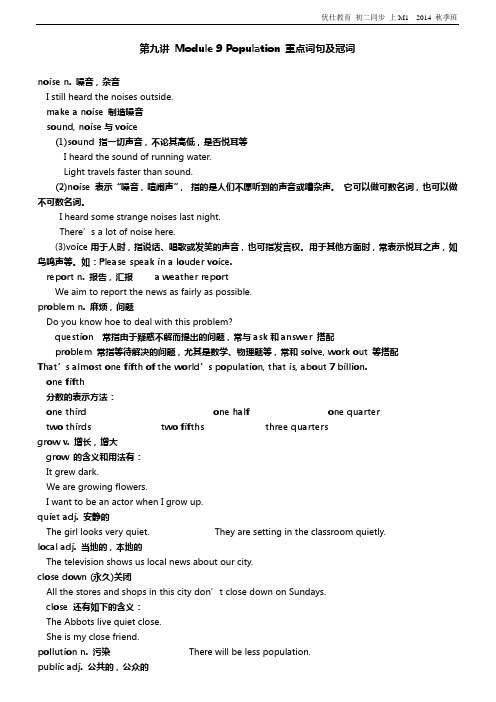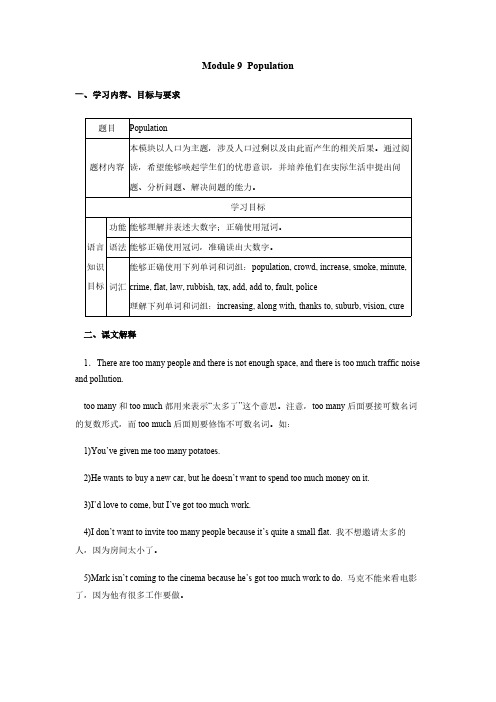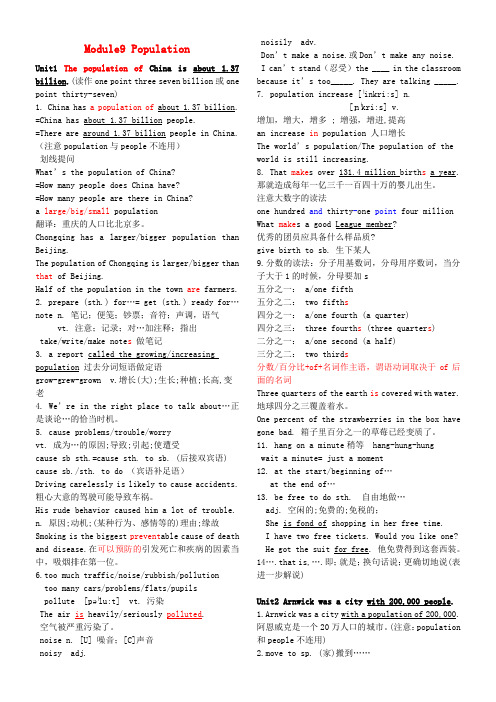Module9Population知识讲解
八年级英语上册 Module 9 Population知识点归纳总结 (新版)外研版

——————————新学期新成绩新目标新方向——————————Module9 PopulationUnit1 The population of China is about 1.37 billion.(读作one point three seven billion或one point thirty-seven)1. China has a population of about 1.37 billion. =China has about 1.37 billion people.=There are around 1.37 billion people in China. (注意population与people不连用)划线提问What’s the population of China?=How many people does China have?=How many people are there in China?a large/big/small population翻译:重庆的人口比北京多。
Chongqing has a larger/bigger population than Beijing.The population of Chongqing is larger/bigger than that of Beijing.Half of the population in the town are farmers.2. prepare (sth.) for…= get (sth.) ready for…note n. 笔记;便笺;钞票;音符;声调,语气vt. 注意;记录;对…加注释;指出take/write/make note s做笔记3. a report called the growing/increasing population 过去分词短语做定语grow-grew-grown v.增长(大);生长;种植;长高,变老4. We’re in the right place to talk about…正是谈论…的恰当时机。
八年级英语上册Module9Population知识点归纳总结新版外研版20180724212-英语备课大师【全免费】

Module9 PopulationUnit1 The population of China is about 1.37 billion.(读作one point three seven billion或one point thirty-seven)1. China has a population of about 1.37 billion.=China has about 1.37 billion people.=There are around 1.37 billion people in China.(注意population与people不连用)划线提问What’s the population of China?=How many people does China have?=How many people are there in China?a large/big/small population翻译:重庆的人口比北京多。
Chongqing has a larger/bigger population than Beijing.The population of Chongqing is larger/bigger than that of Beijing.Half of the population in the town are farmers.2. prepare (sth.) for…= get (sth.) ready for…note n. 笔记;便笺;钞票;音符;声调,语气vt. 注意;记录;对…加注释;指出take/write/make note s做笔记3. a report called the growing/increasing population 过去分词短语做定语grow-grew-grown v.增长(大);生长;种植;长高,变老4. We’re in the right place to talk about…正是谈论…的恰当时机。
外研版初二英语上第九讲 Module 9 Population重点词句及语法 - 副本 (2) - 副本

第九讲Module 9 Population 重点词句及冠词noise n. 噪音,杂音I still heard the noises outside.make a noise 制造噪音sound, noise与voice(1)sound 指一切声音,不论其高低,是否悦耳等I heard the sound of running water.Light travels faster than sound.(2)noise 表示“噪音,喧闹声”,指的是人们不愿听到的声音或嘈杂声。
它可以做可数名词,也可以做不可数名词。
I heard some strange noises last night.There’s a lot of noise here.(3)vo ice用于人时,指说话、唱歌或发笑的声音,也可指发言权。
用于其他方面时,常表示悦耳之声,如鸟鸣声等。
如:Please speak in a louder voice.report n. 报告,汇报 a weather reportWe aim to report the news as fairly as possible.problem n. 麻烦,问题Do you know hoe to deal with this problem?question 常指由于疑惑不解而提出的问题,常与ask和answer 搭配problem 常指等待解决的问题,尤其是数学、物理题等,常和solve, work out 等搭配That’s almost one fifth of the world’s population, that is, about 7 billion.one fifth分数的表示方法:one third one half one quartertwo thirds two fifths three quartersgrow v. 增长,增大grow 的含义和用法有:It grew dark.We are growing flowers.I want to be an actor when I grow up.quiet adj. 安静的The girl looks very quiet. They are setting in the classroom quietly.local adj. 当地的,本地的The television shows us local news about our city.close down (永久)关闭All the stores and shops in this city don’t close down on Sundays.close 还有如下的含义:The Abbots live quiet close.She is my close friend.pollution n. 污染There will be less population.public adj. 公共的,公众的The public library is near the park.“百姓,民众“in publicI am not used to speaking in public.service n. 服务,既可做可数名词,也可做不可数名词The food is good in this restaurant, but the service is poor.同根词:serveThe scientist served the country for 32 years.solve v.解决We don’t know how to solve the problem.。
Module+9+Population讲义 外研版英语八年级上册

Module 9 PopulationUnit 1 The world’s population was about 7.8 billion in 2020.1.I’ m preparing a report called “The world’s population”. 我正在准备一份名叫《世界人口》的报告。
(1)prepare 既可作vt,也可作vi.名词形式为preparation常见固定搭配:①prepare sth. 准备某物Eg. They begin to prepare yangge even a month before the Chinese New Year. 他们甚至在新年前一个月就开始准备秧歌表演。
②prepare to do sth. 准备做某事Eg. My mother prepared to make dumplings for dinner. 我母亲准备包晚饭要吃的饺子。
③prepare ... for ... 为...准备...Eg. He didn’t like having to stay up to prepare things for the next day. 他不喜欢被迫熬夜准备第二天的东西。
④prepare for sth. 为某事/物做准备Eg. Prepare for the worst, hope for the best, and be unsurprised by everything in between. 做好最坏的打算,期望最好的结果,不要对介于两者之间的一切感到惊讶。
【例题】-What is Tom doing?- He is the English speech in the hall.A.paying forB. preparing forC. caring forD. looking for(2)report ①n. 报告;汇报make/give a report 作报告Eg. I am going to make a report to my company. 我将向公司作报告。
外研版八年级英语上册Module 9 Population知识点复习及同步练习

Module 9 Population 一、学习内容、目标与要求题目Population题材内容本模块以人口为主题,涉及人口过剩以及由此而产生的相关后果。
通过阅读,希望能够唤起学生们的忧患意识,并培养他们在实际生活中提出问题、分析问题、解决问题的能力。
学习目标功能能够理解并表述大数字;正确使用冠词。
语法能够正确使用冠词,准确读出大数字。
语言知识目标词汇能够正确使用下列单词和词组:population, crowd, increase, smoke, minute, crime, flat, law, rubbish, tax, add, add to, fault, police理解下列单词和词组:increasing, along with, thanks to, suburb, vision, cure二、课文解释1.There are too many people and there is not enough space, and there is too much traffic noise and pollution.too many和too much都用来表示“太多了”这个意思。
注意,too many后面要接可数名词的复数形式,而too much后面则要修饰不可数名词。
如:1)You’ve given me too many potatoes.2)He wants to buy a new car, but he doesn’t want to spend too much money on it.3)I’d love to come, but I’ve got too much work.4)I don’t want to invite too many people because it’s quite a small flat. 我不想邀请太多的人,因为房间太小了。
5)Mark isn’t coming to the cinema because he’s got too much work to do. 马克不能来看电影了,因为他有很多工作要做。
【外研版】八年级英语上册Module9Population知识点归纳总结(含解析)

Module9 PopulationUnit1 The population of China is about 1.37 billion.(读作one point three seven billion或one point thirty-seven)1. China has a population of about 1.37 billion. =China has about 1.37 billion people.=There are around 1.37 billion people in China. (注意population与people不连用)划线提问What’s the population of China?=How many people does China have?=How many people are there in China?a large/big/small population翻译:重庆的人口比北京多。
Chongqing has a larger/bigger population than Beijing.The population of Chongqing is larger/bigger than that of Beijing.Half of the population in the town are farmers.2. prepare (sth.) for…= get (sth.) ready for…note n. 笔记;便笺;钞票;音符;声调,语气vt. 注意;记录;对…加注释;指出take/write/make note s做笔记3. a report called the growing/increasing population 过去分词短语做定语grow-grew-grown v.增长(大);生长;种植;长高,变老4. We’re in the right place to talk about…正是谈论…的恰当时机。
Module-9-Population-知识讲解
Module 9 Population词汇精讲1. noise ,voice &sound(1)noise可以作可数名词,也可以用作不可数名词,表示“人们不愿听到的声音或嘈杂声”。
例如:I heard some strange noises last night. 昨夜我听见一些奇怪的响声。
There's a lot of noise here. 这个地方人声嘈杂。
(2)voice作名词,意为“声音,嗓音”。
用于人时,指说话、歌唱或发笑的声音,也可指发言权。
用于其它方面时,常含悦耳之声,如鸟鸣声,乐器声音等。
例如:He talked of his trip to Hong Kong in a cheerful voice.他兴高采烈地谈了他的香港之行。
She has a sweet voice. 她声音很甜美。
(3)sound泛指自然界的任何声音,不论其高低、是否悦耳等。
例如:I heard the sound of running water. 我听见流水声。
Light travels faster than sound. 光比声音传播得快。
2. hugehuge是常用词, 用于具体事物或人时, 指“体积或数量大得超过一般情况”; 用于抽象事物时, 作“巨大的”、“无限的”解。
例如:He stood tongue-tied before the huge audience.在大批听众面前他站着说不出话来。
【拓展】(1)big“大的,巨大的”,常指程度,范围,规模,容积,重量,数量等(还可表示“伟大,重要”之意)常可与large互换,多用于具体的、有形的人或物(其反义词多为little/small。
)例如:There is a big tree beside the house.房子旁边有一棵大树。
(2)great“大的,极大的,伟大的,重要的,超乎寻常”,常指面积,数量,程度(或指抽象的东西,如知识,能力,人格等),用来指人时,表示“伟大的,杰出的”,其反义词为little/small。
外研版八年级英语上册Module 9讲义(含导入及详细知识点)
Module 9. Population一、主题:人口(Population)二、必背单词名词:noise噪声;杂声notes笔记;随笔report报告;汇报problem麻烦;问题birth出生flat套房;公寓rubbish垃圾;废弃物pupil学生;(尤指)小学生pollution污染service 公共服务;服务动词:prepare准备;预备grow增长;增大cause造成;引起solve解决问题形容词:huge巨大的;庞大的quiet寂静的;安静的local当地的;本地的public公共的;公众的数词:billion十亿fifth第五;五分之一兼类词:increase n.增大;增长v.增大;增长三、常用短语1、prepare……for…… 为……准备……2、in the right place 在合适的地方3、in the world 在世界上4、one fifth of…… 五分之一……5、the world’s population 世界人口6、that is 也就是说7、hang on (口语)稍等8、write…down 写下……;记下……9、in the future 在将来10、at the start/end of… 在……的开始/结束11、a short/long time 短/长时间12、a piece of…… 一篇……13、close to 靠近14、move to 搬到15、in the city centre 在市中心16、close down (永久)关闭,关停17、a lot of traffic 许多车辆18、public services 公共服务19、help (to)do sth. 帮助做某事20、all over the world 全世界21、another huge problem 另一个大问题22、not……any more 不再……四、重点句型1、谈论人口的句型:(1)What is the population of Beijing ?(2)The population of China is about 1.37 billion.(3)Parkville was near Arnwick ,a city with 200,000 people.2、表示惊讶的句型:I c an’t believe it !3、表示请求问候的句型:Hang on a minute !五、模块语法1、冠词(不定冠词a/an、定冠词the和零冠词)2、数字(nine hundred and seventy-eight、two hundred and three)Module 9.Population详细笔记1. I’m preparing some notes for a report called "Our growing population.”我正在为一篇题为“我们日益增长的人口"的报告准备一些笔记。
外研版八年级英语上册Module 9讲义(含导入及详细知识点)
M o d ule 9. Population一、主题:人口(Populat ion)二、必背单词名词:noise噪声;杂声notes笔记;随笔repor t报告;汇报prob l e m 麻烦;问题b i r th出生 f la t套房;公寓rubb ish垃圾;废弃物pupi l学生;(尤指)小学生pol lu t ion 污染servi ce 公共服务;服务动词:prepare准备;预备grow 增长;增大cause造成;引起so lve解决问题形容词:huge 巨大的;庞大的quiet寂静的;安静的loca l当地的;本地的publ i c公共的;公众的数词:bi l l ion十亿 f i f th第五;五分之一兼类词:increase n.增大;增长v.增大;增长三、常用短语1、prepare……fo r……为……准备……2、in the r ight p l ace 在合适的地方3、in the wor ld在世界上4、one f i f th o f……五分之一……5、the wor ld’s popula t ion世界人口6、that i s也就是说7、hang on (口语)稍等8、wr i te…down写下……;记下……9、in the fu ture在将来10、at the s ta r t/end of…在……的开始/结束11、a shor t/long t ime 短/长时间12、a p iece o f……一篇……13、c lose to靠近14、move to搬到15、in the c i ty centre在市中心16、c lose down (永久)关闭,关停17、a lo t o f t ra f f i c许多车辆18、publ i c serv ic es公共服务19、he lp(to)do s th.帮助做某事20、a l l over the w or ld全世界21、another huge prob le m 另一个大问题22、not……any more不再……四、重点句型1、谈论人口的句型:(1)W hat i s the populat ion of Be i j ing?(2)The populat ion of Ch ina i s about 1.37 b i l l ion.(3)Parkv i l l e was near Arnwick,a c i ty with 200,000 people.2、表示惊讶的句型:I can’t be l ieve i t!3、表示请求问候的句型:Hang on a minute!五、模块语法1、冠词(不定冠词a/an、定冠词the和零冠词)2、数字(n ine hundred and seventy-e ight、two hundred and three)M o d ule 9.Populat ion 详细笔记1.I’m prepar ing so me notes for a report ca l led "O ur gro wing populat ion.”我正在为一篇题为“我们日益增长的人口"的报告准备一些笔记。
外研版八年级英语上册Module 9 Population知识点复习及同步练习
Module 9 Population一、学习内容、目标与要求二、课文解释1.There are too many people and there is not enough space, and there is too much traffic noise and pollution.too many和too much都用来表示“太多了”这个意思。
注意,too many后面要接可数名词的复数形式,而too much后面则要修饰不可数名词。
如:1)You’ve given me too many potatoes.2)He wants to buy a new car, but he doesn’t want to spend too much money on it.3)I’d love to come, but I’ve got too much wor k.4)I don’t want to invite too many people because it’s quite a small flat. 我不想邀请太多的人,因为房间太小了。
5)Mark isn’t coming to the cinema because he’s got too much work to do. 马克不能来看电影了,因为他有很多工作要做。
2.Along with the crowds, the smoke, and the transport problems. 还有人口、烟雾以及交通问题。
这句话是接着上一句的。
上句话中谈到了环境问题,本句就接着说人口、烟以及交通等问题。
along with sb./sth.相当于together with,意思是“连同,跟……一块儿”。
如:There was a bill along with the parcel. 随同包裹来的还有一张账单。
3.You know the school prize-giving’s coming up next week…在本句话中,come up是一个短语动词,意思是“进行,举行,发生”(to happen, usually unexpectedly)。
- 1、下载文档前请自行甄别文档内容的完整性,平台不提供额外的编辑、内容补充、找答案等附加服务。
- 2、"仅部分预览"的文档,不可在线预览部分如存在完整性等问题,可反馈申请退款(可完整预览的文档不适用该条件!)。
- 3、如文档侵犯您的权益,请联系客服反馈,我们会尽快为您处理(人工客服工作时间:9:00-18:30)。
Module 9 Population词汇精讲1. noise ,voice &sound(1)noise 可以作可数名词,也可以用作不可数名词,表示“人们不愿听到的声音或嘈杂声”。
例如:I heard some strange noises last night. 昨夜我听见一些奇怪的响声。
There's a lot of noise here. 这个地方人声嘈杂。
(2)voice 作名词,意为“声音,嗓音”。
用于人时,指说话、歌唱或发笑的声音,也可指发言权。
用于其它方面时,常含悦耳之声,如鸟鸣声,乐器声音等。
例如:He talked of his trip to Hong Kong in a cheerful voice. 他兴高采烈地谈了他的香港之行。
She has a sweet voice. 她声音很甜美。
(3)sou nd泛指自然界的任何声音,不论其高低、是否悦耳等。
例如:I heard the sound of running water. 我听见流水声。
Light travels faster than sound. 光比声音传播得快。
2. hugehuge 是常用词, 用于具体事物或人时, 指“体积或数量大得超过一般情况” ;用于抽象事物时, 作“巨大的”、“无限的”解。
例如:He stood tongue-tied before the huge audience. 在大批听众面前他站着说不出话来。
【拓展】(1)big “大的,巨大的”,常指程度,范围,规模,容积,重量,数量等(还可表示“伟大,重要”之意)常可与large 互换,多用于具体的、有形的人或物(其反义词多为little/small 。
)例如:There is a big tree beside the house.房子旁边有一棵大树。
(2)great 大“的,极大的,伟大的,重要的,超乎寻常”,常指面积,数量,程度(或指抽象的东西,如知识,能力,人格等),用来指人时,表示“伟大的,杰出的”,其反义词为little/small 。
例如:We heard a great n oise我们听到一个很大的响声。
【注意】big还可以作长大了”解,great有时可表达说话人的喜悦、赞扬等感情。
例如:Lily is big enough to ride a bike. 莉莉长大了,可以骑自行车了。
He's the greatest man I have ever seen. 他是我见过的最伟大的人物。
(3)large “大的,巨大的”,常指面积,范围,可表示数和量(当它直接用于人时,可表示身体的大),其反义词为small。
例如:They say China is a large and beautiful country. 他们说中国是一个面积大而美丽的国家。
3. question&problemquestion 和problem 都有“问题”的意思,但用法不同。
question 指须解答的问题,是就疑问而言的;problem 指须解决的问题,是就困难而言的。
例如:What's your question? Can you answer it?你的问题是什么?你能自己回答吗?What's your problem? Can you solve it by yourself?你的问题(困难)是什么?你能自己解决吗?4. billion(1)billion是数词,意为十亿”当表示具体的几十亿”时,用基数词+ billion ,注意不加-s。
第 1 页例如:The bank has assets of more than £ 1 billion.该银行有10亿多英镑的资产。
1.5 billi on cubic meters of earth were/was moved.共搬运土方15亿立方米。
(2)billio ns of表示数十亿的,几十亿的"这时billio n后要加-s,且后面有介词of,但是不能与数词连用。
例如:There are billio ns of trees in the forest.森林里有几十亿棵树。
(3)表示数词的还有thousand千” million百万” hundred百”它们的用法和billion 一样,可以用来表示约数和确数。
例如:There are milli ons of people in the country. 在这个国家里有数百万个人。
There are nine hundred students in our school. 我们学校有900 名学生。
5. too many, too much& much too例如:Don' t eat too much sweet. It ' s bad for your teeth.不要吃太多的糖,对牙齿不好。
There are too many books in the room. You can choose any one to read.房间里有太多的书了,你可以选择任何一本来读。
It ' s much too cold outside. You should put on your coat. 外面太冷了,你应该穿上外套。
6. quietquiet意为安静的,文静的”可作定语或表语。
例如:They walked to a quiet place.他们向一个安静的地方走去。
You have a cold, so you must keep quiet at home.你感冒了,所以必须在家静养。
【拓展】calm , still , quiet与silent的辨析(1)calm意为镇静的;平静的”。
指不受干扰时的宁静、平静;指人时表示沉着的、镇定的。
(2)still意为不动的;静止的”。
指物理上的安静状态。
(3)quiet意为安静的;静止的”。
指寂静的状态,没有吵闹、骚乱,指人表示娴静、文静。
(4)silent意为沉默的;无言的”。
主要指人,指不发出声音或不说话,强调无声的状态。
例如:When we face dan ger, we should keep calm.面对危险,我们应该保持沉着、冷静。
The baby kept still whe n she was taki ng photos.当给这个婴儿拍照时,她一动也不动。
Be quiet, every one. The teacher is coming. 同学们,安静!老师来了。
We shouldn' t keep silent when the teacher asks us some questions.当老师问我们问题时,我们不应该保持沉默。
【注意】quiet意为安静的” quite意为相当”7. alsoalso意为也” 一般放在句中。
用于be动词、情态动词、助动词之后,实义动词之前,比too 要正式一些。
例如:He can speak English. I can also speak English. 他会说英语,我也会说。
He can also speak English. 他也会说英语。
I also like music. 我也喜欢音乐。
【拓展】(1)too 意为“也”,一般放在肯定句句尾,前面一般用逗号与句子隔开。
例如:He can speak English. I can speak English, too. 他会说英语,我也会说。
(2)either 意为“也”,用于否定句的句尾。
例如:He can ' t swim. I can ' t swim他不会游泳,我也不会。
(3)as well 意为“也”,用于肯定句句末,前面一般不用逗号。
例如:They want to play this game as well. 他们也想玩儿这个游戏。
8. 较大的基数词的读法(1)三位数的读法:第一个数字+ hundred + and + 后面的一位数或两位数字。
例如:202读作two hundred and two450 读作four hundred and fifty(2)千以上的数字的读法从右往左数,每三位点一个逗号;第一个逗号前读thousand (千),第二个逗号前读million (百万),第三个逗号前读billion (十亿)。
例如:1,111 读作one thousand, one hundred and eleven1,451, 432 读作one million, four hundred and fifty-one thousand, four hundred and thirty-two1,857, 826, 724 读作one billion, eight hundred and fifty- seven million, eight hundred and twenty-six thousand, seven hundred and twenty-four词汇精练I .英汉互译。
1. 记笔记________2. 谈论_________________3. move to __________4. (永久)关闭________5. as well ________6. 越来越多 ___________n.根据首字母提示或者汉语提示补全单词。
1. The ____ (当地的)government took some steps to do that.2. It ' s our duty to againest_th ___ (污染).3. I don ' t like the restaurant because of the bad _____ 服__务_() .4. It ' s our duty to p ______ t he animals in danger.5. She wants to be a singer when she grows up because everyone says that she has abeautiful v ______ .6. I can' t go out to play with you because I have too m ______ h omework to do.7. -What' s your p _______ ?-I can ' t learn math well. I ' m worried.8. I was born in a small village, but I want to live in a h _____ city like Beijing.9. What ' hse tp ____ of China?10. It ' s a p ________ sc hool instead of a private school.第 3 页川.用括号中单词的正确形式填空。
